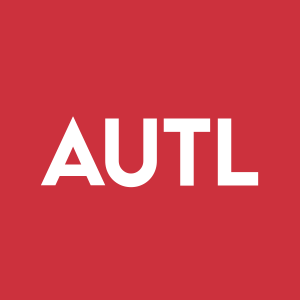Autolus Therapeutics Presents Long-Term Follow Up from the FELIX Study Demonstrating Obe-Cel's Potential for Long-Term Remission in R/R B-ALL at the 2025 European Hematology Association (EHA) Congress
Rhea-AI Summary
Positive
- 38.4% of responders achieved ongoing remission without requiring additional therapy
- Median duration of response reached 42.6 months, showing strong durability
- Over 50% of patients maintained remission at 24 months
- Demonstrated effectiveness across all age groups, including older adults
- No new safety signals or Grade ≥3 secondary malignancies observed in extended follow-up
Negative
- None.
News Market Reaction – AUTL
On the day this news was published, AUTL declined 4.02%, reflecting a moderate negative market reaction.
Data tracked by StockTitan Argus on the day of publication.
- Median duration of response in FELIX study now 42.6 months after an additional 11 months of follow up
- More than half of patients still in remission at 24 months
38% of ongoing responders did not receive any subsequent therapy by month 33- Results suggest a proportion of patients with r/r B-ALL may not need further therapy following treatment with obe-cel
LONDON, June 12, 2025 (GLOBE NEWSWIRE) -- Autolus Therapeutics plc (Nasdaq: AUTL), an early commercial-stage biopharmaceutical company developing, manufacturing and delivering next-generation programmed T cell therapies, today announces updated long term data (up to approximately three years of follow up) from the FELIX study of obecabtagene autoleucel (obe-cel) in adult patients with relapsed/refractory (r/r) B-cell acute lymphoblastic leukemia (B-ALL), to be presented in an oral presentation at the European Hematology Association (EHA) Congress between June 12-15, 2025, in Milan, Italy. Autolus will also present an additional oral and poster presentation, the details of which are included below.
“Obe-cel’s durability of response without any subsequent therapy in two out of every five responders is a key factor leading the transformation of therapy for adult r/r B-ALL patients. At a median follow up of 33 months, we are encouraged to see a continuation of the long-term plateau we observed at the last data cut,” said Dr. Christian Itin, Chief Executive Officer of Autolus. “A well-tolerated, effective, durable treatment option for ALL patients who often have a poor prognosis and have had multiple prior treatments is of significant clinical benefit.”
Oral S113:
Title: Can CAR T-cell therapy be a definitive treatment for adult r/r B-ALL without transplant? Long-term findings and predictors of sustained remission for obecabtagene autoleucel
Session Name: s447 Immunotherapy and CAR-T cells for ALL
Session room: Coral 6
Session Date and Time: Sunday, June 15; 11:00 - 12:15 CEST
Presenting Author: Jae H Park, MD
Summary: At the updated median follow up of 32.8 months,
The multivariate analysis demonstrated that Philadelphia chromosome-positive disease, earlier obe-cel use, and relapsed disease correlated with achieving higher remission rates. Lower disease burden at lymphodepletion and ongoing CAR T-cell persistence were independent factors associated with long-term remission and survival.
Oral S114:
Title: Efficacy and Safety Outcomes of Obecabtagene Autoleucel (obe-cel) Stratified by Age in Patients with r/r B-ALL
Session Name: Immunotherapy and CAR-T cells for ALL
Session Room: Coral 6
Session Date and Time: Sunday, June 15; 11:00 - 12:15 CEST
Presenting Author: Bijal D. Shah, MD
Summary: Obe-cel treatment was associated with deep and durable remissions resulting in favorable overall remission rate, event free survival, and overall survival with low incidence of Grade ≥3 CRS and ICANS in both age groups (<55 years and ≥55 years). These findings indicate that obe-cel is effective and has a positive benefit and risk profile regardless of patient age, including in older adults with R/R B-ALL.
Poster PF378:
Title: Predicting Hematotoxicity Risk and Outcomes in Relapsed/Refractory B-Cell Acute Lymphoblastic Leukemia (r/r B-All): Should Hematotox Models be CAR Specific Rather than Disease Specific
Session Title: Poster Session 1
Session date and time: Friday, June 13; 18:30 - 19:30 CEST.
Presenting Author: Claire Roddie, MD
Summary: Although both the CAR-Hematotox (CAR-HT) model, and the ALL-Hematotox (ALL-HT) model show potential, ALL-HT appears to improve risk stratification and may be a better predictor of response, survival and safety outcomes in adult patients with r/r B-ALL treated with obe-cel, than CAR-HT. Taken together with other published reports, our data suggest that the strength of HT-model predictions may be CAR T-cell product specific. Further analyses are needed.
About Autolus Therapeutics plc
Autolus Therapeutics plc (Nasdaq: AUTL) is an early commercial-stage biopharmaceutical company developing, manufacturing and delivering next-generation T cell therapies and candidates for the treatment of cancer and autoimmune disease. Using a broad suite of proprietary and modular T cell programming technologies, Autolus is engineering precisely targeted and controlled T cell therapies that are designed to better recognize target cells, break down their defense mechanisms and eliminate these cells. Autolus has an FDA approved and MHRA licensed product, obe-cel, and a pipeline of product candidates in development for the treatment of hematological malignancies, solid tumors and autoimmune diseases. For more information, please visit www.autolus.com.
About obe-cel FELIX clinical trial
Autolus’ Phase 1b/2 clinical trial of obe-cel enrolled adult patients with r/r B-precursor ALL. The trial had a Phase 1b component prior to proceeding to the single arm, Phase 2 clinical trial. The primary endpoint in the pivotal cohort was overall response rate, and the secondary endpoints included duration of response, MRD negative complete remission rate and safety. The trial enrolled over 100 patients across 30 of the leading academic and non-academic centers in the United States, United Kingdom and Europe. [NCT04404660].
Contact:
Amanda Cray
+1 617-967-0207
a.cray@autolus.com
Olivia Manser
+44 (0) 7780 471 568
o.manser@autolus.com








